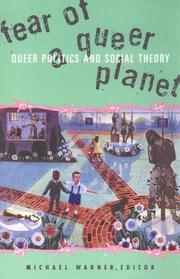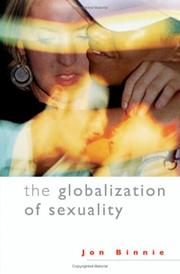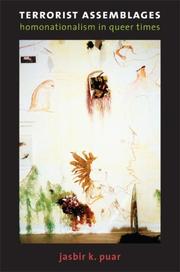| Listing 1 - 9 of 9 |
Sort by
|
Book
ISBN: 9782358720991 2358720992 Year: 2017 Publisher: Paris: La fabrique,
Abstract | Keywords | Export | Availability | Bookmark
 Loading...
Loading...Choose an application
- Reference Manager
- EndNote
- RefWorks (Direct export to RefWorks)
Book
ISBN: 9782081256590 2081256592 Year: 2013 Publisher: Paris: Flammarion,
Abstract | Keywords | Export | Availability | Bookmark
 Loading...
Loading...Choose an application
- Reference Manager
- EndNote
- RefWorks (Direct export to RefWorks)
Les homosexuels peuvent se marier à Johannesburg et à Mexico, mais pas à Chicago ni à Berlin. En Iran, ils risquent la pendaison alors que les transsexuels se font opérer légalement. En Chine, ils sont des millions à fréquenter les réseaux sociaux gays, mais les militants sont harcelés. En Israël, l'homosexualité devient peu à peu "casher", mais dans le monde musulman elle n'est toujours pas "halal". Dans huit pays, les homosexuels risquent la peine de mort ; dans soixante-seize, la prison. Pourtant, sur tous les continents, la révolution gay est en marche. Un jour, l'homosexualité sera peut-être moins pénalisée que l'homophobie. En Europe, l'orientation sexuelle devient le choix de chacun. À l'ONU, la dépénalisation avance. Aux États-Unis, Obama a été réélu, notamment avec les voix gays. La mondialisation de la question homosexuelle est un phénomène majeur, qui n'a pas encore été décrit. Pendant cinq ans, dans quarante-cinq pays, Frédéric Martel a mené une enquête inédite et rencontré sur le terrain des centaines d'acteurs de cette révolution. À travers le prisme gay, il analyse la mutation des modes de vie, la redéfinition du mariage, l'émancipation parallèle des femmes et des gays, les effets décisifs de la culture et d'Internet. Fil rouge de l'évolution des mentalités, la question gay et lesbienne est un critère pertinent pour juger de l'état d'une démocratie et de la modernité d'un pays. Ce livre, à la fois inquiet et optimiste, riche en portraits inattendus, raconte la nouvelle bataille des droits de l'homme.
Gays --- Homosexuality --- Gay rights --- Social conditions --- Social aspects --- Political aspects --- 658.1 Gelijke kansen --- LGBTQI+ --- Gays - Social conditions --- Homosexuality - Social aspects --- Homosexuality - Political aspects --- 658.2 LGBTQI+

ISBN: 0816623341 0816623333 9780816623334 9780816623341 Year: 2004 Volume: 6 Publisher: Minneapolis: University of Minnesota press,
Abstract | Keywords | Export | Availability | Bookmark
 Loading...
Loading...Choose an application
- Reference Manager
- EndNote
- RefWorks (Direct export to RefWorks)
"In recent years, lesbians and gay men have developed a new, aggressive style of politics. At the same time, innovative intellectual energies have made queer theory an explosive field of study. In "Fear of a Queer Planet", Michael Warner draws on emerging new queer politics, and shows how queer activists have come to challenge basic assumptions about the social and political world. Existing traditions of theory - Marxism, cultural studies, psychoanalysis, anthropology, legal theory, nationalism, and antinationalism - have too often presupposed a heterosexual society, as the essays in this volume demonstrate. "Fear of a Queer Planet" suggests a new agenda for social theory. It moves beyond the idea that lesbians and gay men share a minority identity and special interests and that their issues can be subordinated to more general social conflicts. Instead, Warner and the other contributors to this volume show that queer sexualities take many forms, are the subject of many kinds of conflict and struggles, and must be taken as a starting point in thinking about cultural politics. This collection explores the impact of ACT UP, Queer Nation, multiculturalism, the new religious right, outing, queerness, postmodernism, and other shifts in the politics of sexuality. The authors featured speak from different backgrounds of gender, race, nationality, and discipline. Together, they show how struggles over sexuality have profound implications for progressive politics, social theory, and cultural studies." --
Homosexuality --- Gays --- Political aspects --- Philosophy --- Political activity --- Queer theory. --- United States --- Homosexuality - Political aspects - United States. --- Homosexuality - United States - Philosophy. --- Gays - United States - Political activity. --- Philosophy. --- Homosexuality - Political aspects - United States --- Homosexuality - United States - Philosophy --- Gays - United States - Political activity --- Sociology of the family. Sociology of sexuality --- Gay people
Book
ISBN: 9782354801076 2354801076 Year: 2012 Publisher: Paris: Amsterdam,
Abstract | Keywords | Export | Availability | Bookmark
 Loading...
Loading...Choose an application
- Reference Manager
- EndNote
- RefWorks (Direct export to RefWorks)
Homosexuality --- Terrorism --- Queer theory --- Homosexualité --- Terrorisme --- Théorie allosexuelle --- Political aspects --- Social aspects --- Aspect politique --- Aspect social --- Gays --- Social conditions --- Homosexualité --- Théorie allosexuelle --- Homosexuality - Political aspects --- Terrorism - Social aspects --- Gays - Social conditions
Book
ISBN: 9782724622454 9782724622461 9782724622478 9782724622485 2724622456 Year: 2018 Publisher: Paris: SciencesPo, Les Presses,
Abstract | Keywords | Export | Availability | Bookmark
 Loading...
Loading...Choose an application
- Reference Manager
- EndNote
- RefWorks (Direct export to RefWorks)
"In 2012 and 2013, masses of French citizens took to the streets to demonstrate against a bill on gay marriage. But demonstrators were not merely denouncing its damaging effects; they were also claiming that its origins lay in "gender theory," an ideology imported from the United States. By "gender theory" they meant queer theory in general and, more specifically, the work of noted scholar Judith Butler. Now French opponents to gay marriage, supported by the Vatican, are attacking school curricula that explore male/female equality, which they claim is further proof of gender theory's growing empire. They fear that this pro-homosexual propaganda will not only pervert young people, but destroy the French nation itself. What are the various facets of the French response to queer theory, from the mobilization of activists and the seminars of scholars to the emergence of queer media and the decision to translate this or that kind of book? Ironically, perceiving queer theory as a threat to France means overlooking the fact that queer theory itself has been largely inspired by French thinkers. By examining mutual influences across the Atlantic, Bruno Perreau analyzes changes in the idea of national identity in France and the United States. In the process, he offers a new theory of minority politics: an ongoing critique of norms is not only what gives rise to a feeling of belonging; it is the very thing that founds citizenship."--Publisher's description. Après l'ouverture du mariage aux couples homosexuels en France, les mouvements réactionnaires ont orchestré une vaste campagne contre la "théorie du genre" , dangereuse propagande venue tout droit des campus américains. Bruno Perreau démontre que cette campagne s'attaque en réalité à la théorie queer, précisément parce que celle-ci est largement inspirée de penseurs français tels que Foucault, Beauvoir et Derrida. Il propose une enquête sur les liens entre identité, communauté et nation en France : si la théorie queer dérange autant, c'est parce qu'elle soutient l'idée que le sentiment d'appartenance ne naît pas d'un socle de valeurs et de références communes mais, au contraire, de la capacité à en contester le bien-fondé. Qui a peur de la théorie queer ? présente les nombreuses facettes de la réponse à la théorie queer en France, de la Manif pour tous au militantisme lesbien, gay, bi et trans, en passant par les séminaires de recherche, l'émergence de nouveaux médias, les politiques de traduction ou encore les débats autour du nationalisme et de l'intersectionnalité. Contre l'idée de "tyrannie des minorités" , Bruno Perreau propose une théorie critique de la représentation, plus attentive et plus hospitalière.
Queer theory --- Homosexuality --- Same-sex marriage --- Group identity --- Nationalism --- Nationalism. --- Queer theory. --- Political aspects --- Political aspects. --- France. --- France --- Sociological theories --- Queer theory - France --- Homosexuality - Political aspects - France --- Same-sex marriage - Political aspects - France --- Group identity - Political aspects - France --- Nationalism - France

ISBN: 0761959351 076195936X 9780761959359 Year: 2004 Publisher: London: Sage,
Abstract | Keywords | Export | Availability | Bookmark
 Loading...
Loading...Choose an application
- Reference Manager
- EndNote
- RefWorks (Direct export to RefWorks)
Fonds Suzan Daniel (FSD)
Homosexuality --- Political aspects --- Political aspects. --- Sociology of the family. Sociology of sexuality --- #SBIB:043.IOS --- #SBIB:613.88H10 --- #SBIB:35H436 --- #SBIB:316.334.3M20 --- Seksualiteit: algemeen --- Beleidssectoren: welzijn, volksgezondheid en cultuur --- Sociale epidemiologie en etiologie: sociale aspecten van ziekte en gezondheid --- Homosexuality - Political aspects
Book
ISSN: 12995754 ISBN: 9782842717766 2842717767 Year: 2017 Publisher: Paris: La musardine,
Abstract | Keywords | Export | Availability | Bookmark
 Loading...
Loading...Choose an application
- Reference Manager
- EndNote
- RefWorks (Direct export to RefWorks)
"Il restait à écrire une histoire ordinaire de l'homosexualité, qui rende compte des réalités que taisent les livres d'histoire et les films documentaires. Érik Rémès le fait brillamment en livrant un témoignage exceptionnel sur la vie des homosexuels français dans les dernières années du XXe siècle. Après la dépénalisation en 1982, il décrit entre humour et gravité des années pleines de contrastes : années de la fête malgré la stigmatisation, affirmation de la fierté dans les affres du sida, progression des droits sur fond d'homophobie. Pride, chroniques de la révolution gay est un recueil d'articles, éditoriaux, billets d'humeurs, coups de gueule, et témoignages, dans leurs versions intégrales non censurées, parus entre 1992 et 2005 dans la presse gay et généraliste : Libération, Nova magazine, Gai Pied Hebdo, Illico, etc. En douze chapitres : Visibilité, Mariage, Homoparentalité, Homophobie, Hétérophobie, Politique, Homonormativité, Subversion, Voyage, Drogues, Sexualité, Prévention, Années sida." --
Gays --- Homosexuality --- Social conditions --- History --- Social aspects --- Political aspects --- Sociology of the family. Sociology of sexuality --- Gays - France - Social conditions --- Homosexuality - France - History - 20th century --- Gays - Social conditions --- Homosexuality - Social aspects --- Homosexuality - Political aspects --- Homosexualité --- 1992-2005 --- Chroniques françaises --- Gay rights --- Social conditions. --- Gay people
Book
ISBN: 1849542368 Year: 2011 Publisher: New York : Biteback Publishing,
Abstract | Keywords | Export | Availability | Bookmark
 Loading...
Loading...Choose an application
- Reference Manager
- EndNote
- RefWorks (Direct export to RefWorks)
TORY PRIDE AND PREJUDICE is an authoritative but highly accessible account of the Conservative Party's social attitudes from the 1950s to the present day, with a particular focus on homosexual law reform and equal rights for LGBT citizens. Presented in the context of contemporary social and political developments, it draws upon extensive primary research and exclusive interviews to chart the party's progress from a stubborn unwillingness to decriminalise homosexuality in the 1950s and 1960s, via tacit acceptance in the 1970s and Section 28 in the 1980s and 1990s, to the current Conservative-Li
Conservative Party (Great Britain). --- Great Britain -- Politics and government -- 1945-. --- Homosexuality -- Law and legislation -- Great Britain -- History -- 20th century. --- Homosexuality -- Political aspects -- Great Britain -- History -- 20th century. --- Homosexuality --- Homosexuality --- History --- Political aspects --- Law and legislation --- History --- Conservative Party (Great Britain) --- Great Britain --- Politics and government

ISBN: 9780822341147 9780822340942 0822340941 082234114X 9786612923593 1282923595 0822390442 Year: 2007 Publisher: Durham : Duke University Press,
Abstract | Keywords | Export | Availability | Bookmark
 Loading...
Loading...Choose an application
- Reference Manager
- EndNote
- RefWorks (Direct export to RefWorks)
Puar argues that configurations of sexuality, race, gender, nation, class and ethnicity are realigning in relation to contemporary forces of securitization, counterterrorism, and nationalism, and examines how liberal politics serve to incorporate certain queer subjects into the fold of the nation-state.
Sociology of minorities --- Sociology of the family. Sociology of sexuality --- United States --- Homosexuality --- Terrorism --- Political aspects --- Social aspects --- #SBIB:316.7C150 --- #SBIB:39A3 --- #SBIB:321H81 --- Same-sex attraction --- Sexual orientation --- Bisexuality --- Political aspects. --- Social aspects. --- Cultuursociologie: minderheden en cultuur --- Antropologie: geschiedenis, theorie, wetenschap (incl. grondleggers van de antropologie als wetenschap) --- Westerse politieke en sociale theorieën vanaf de 19e eeuw : nationalisme, corporatisme, fascisme, nationaal socialisme, rechtsextremisme, populisme --- Homosexuality - Political aspects --- Terrorism - Social aspects
| Listing 1 - 9 of 9 |
Sort by
|

 Search
Search Feedback
Feedback About UniCat
About UniCat  Help
Help News
News